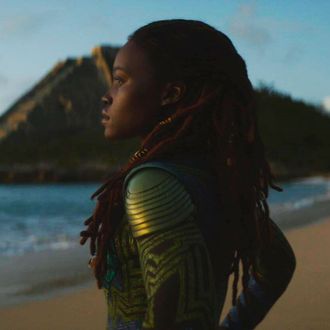
Reviews for Black Panther: Wakanda Forever are here, and critics can agree on one thing alone: The loss of Chadwick Boseman weighs heavily on the film. After the man who carried the original film on his shoulders unexpectedly died from cancer in 2020, director Ryan Coogler and co-writer Joe Robert Cole had no choice but to craft a world without the charm and grace of Boseman’s T’Challa, who gets a proper send-off in the beginning of the film. Wakanda Forever considers grief, but it must also navigate an ever-sprawling cinematic universe that prioritizes the mechanical storytelling requirements of the brand over its individual entries. Based on first reviews, some critics found the globe-trotting plot to be simultaneously overwrought and anemic, though others found it an interesting allegory for contemporary geopolitics. While critics appreciate Coogler’s tale about two isolated utopias in the Global South, reviews vary on whether or not the film dives beyond the surface of these themes and captures the political fervor of the original. Below, the early takeaways from Black Panther: Wakanda Forever.
“To say the film is overtaxed is an understatement. Regrettably, Black Panther: Wakanda Forever tries to do so many things that it comes across as threadbare and pallid — less a failure of imagination and more of circumstance, time, and narrative constraints.” —Angelica Jade Bastién, Vulture
“Although the sequel’s running time is more sprawling and its narrative goals more diffuse than its predecessor’s, it shares the same strengths. Wakanda Forever is fueled by intricate world-building, stunningly designed sets and costumes, and an interest in the geopolitical implications of superheroism that’s far more nuanced than most Marvel movies allow.” —David Sims, The Atlantic
“It turns out that the rest of Wakanda Forever will be one long eulogy as well, with the next 2½ hours toggling between overbusy storytelling and coping with sadness and loss. Wakanda Forever winds up feeling hopelessly stalled, covering up an inability to move on by resorting to repetitive, over-familiar action sequences, maudlin emotional beats and an uninvolving, occasionally incoherent story.” —Ann Hornaday, the Washington Post
“The hulking script is chock-full of ideas and themes. Rather than fighting their common enemy (white colonists), two kingdoms helmed by people of color are pitted against each other (an idea that never thematically lands), and the film must delve into the cultural pain that still exists from the historical annihilation of Central and South America’s Indigenous kingdoms. It must also contend with a bevy of other requirements: setting up the Marvel TV series Ironheart (which Dominique Thorne will star in), acknowledging The Snap, grieving Boseman’s death, and finding a new Black Panther. These competing interests are no less smoothed out by MCU’s blockbuster demands (that this must be a mainstream hit and usher in the next phase of the cinematic universe) and the weight of satiating Black folks who feel seen by the fantastical confirmation of Black regalism. It’s too much for one movie. And you get the sense that this should’ve been two.” —Robert Daniels, Roger Ebert
“For all of its blockbuster bombast and globe-trotting conflict, Black Panther: Wakanda Forever is, in a sense, framed around just one person: Chadwick Boseman. The loss of the Black Panther star, who tragically died in 2020, isn’t just taken as a logistical problem for the franchise to fix. There’s real pain behind this film. In addressing Boseman’s passing, returning director/co-writer Ryan Coogler and co-writer Joe Robert Cole movingly and tastefully blur the lines between the real and the fictional.” —Kambole Campbell, Empire
“Wakanda Forever is overlong, a little unwieldy and somewhat mystifyingly steers toward a climax on a barge in the middle of the Atlantic. But Coogler’s fluid command of mixing intimacy with spectacle remains gripping. He extends the rich detail and non-binary complexity that distinguished Black Panther in sometimes awkward but often thrilling ways. Wakanda Forever, grappling in the aftermath of loss, ultimately seeks something rare in the battle-ready superhero landscape: Peace.” —Jake Coyle, Associated Press
“Some will no doubt miss the tight focus and energy of Black Panther. This sequel is more scattered, a vast expansion with a hole at its center. In their mourning, the film’s characters are tossed to the wind, atomized on their own sad trajectories. But so, it seems, is the film itself, keeping busy so it doesn’t get dragged down in the undertow of its despair. One wishes that Coogler and company had more time to process, to collect themselves and figure out the truly best way forward, rather than grafting different characters onto a story once meant for T’Challa. But economics waits for no period of reflection, and so they have done their timely contractual duty in as noble a fashion as, perhaps, was possible.” —Richard Lawson, Vanity Fair
“There come moments in Wakanda Forever when it feels fair to wonder who we’re really rooting for. Never is this more apparent than in scenes involving the CIA (embodied by a returning Martin Freeman as Everett K. Ross, as well as by a surprising, funny cameo that I won’t spoil). Here, Wakanda Forever stumbles; the relationship between Wakanda and its “favorite colonizer” veers a little too close to cute, a little too buddy-buddy, without anywhere near the same level of thoughtfulness that the movie brings to bear on the rest of its story.” —K. Austin Collins, Rolling Stone
“Watching Wakanda Forever, it’s almost unavoidable that we feel the absence of Boseman’s heroic dramatic center of gravity. The movie doesn’t have the classic comic-book pow of Black Panther, and it’s easily 20 minutes too long (we could probably have lived without the Talokan backstory). Yet Wakanda Forever has a slow-burn emotional suspense. Once the film starts to gather steam, it doesn’t let up.” —Owen Gleiberman, Variety
“In T’Challa’s absence, Wakanda has become, at least for the moment, a matriarchy, and Wakanda Forever displays a matter-of-fact superhero feminism grounded in the personalities of the performers and their characters. Bassett, Wright, Gurira, Williams and Coel — rejoined by Lupita Nyong’o as Nakia, who shows up a bit late in the action — form the kind of fractious, formidable ensemble that should be a franchise in its own right. And quite possibly will be. It’s called Wakanda Forever, and in the Marvel Universe that sounds less like a slogan than a terms of service guarantee.” —A.O. Scott, New York Times
“Despite the culture-shaking impact of its predecessor and the tragic context of Boseman’s death — both of which this film tackles head-on — Wakanda Forever is almost by nature more conventional and less exultant than Black Panther. Its highs are lower, its lows are more exasperating, and its oceanic undercurrents of loss and healing can be hard to feel amid a cluttered story that spends too much time on the surface.” —David Ehrlich, IndieWire


